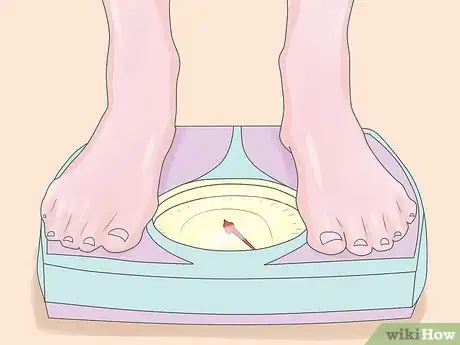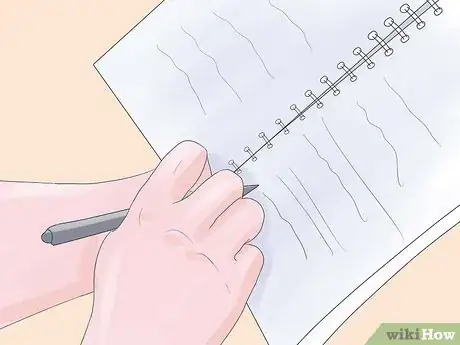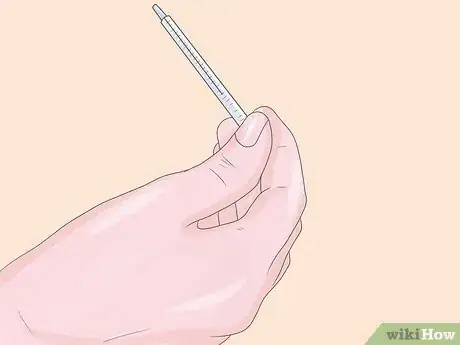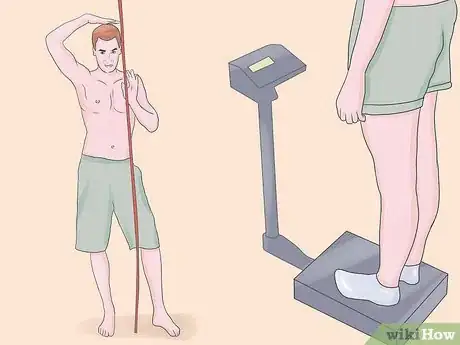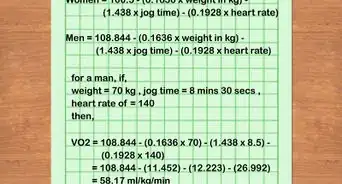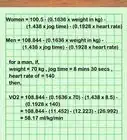This article was co-authored by Ross Dempsey. Ross Dempsey is a Personal Trainer, Health Coach, and the Host of The Progression Health Podcast. With over six years of experience working with clients in one-on-one personal training, Ross uses science-based health coaching to help individuals achieve their goals. He holds a Bachelors degree in Sports and Exercise from the Waterford Institute of Technology and a Master’s degree in Exercise Physiology from the National University of Ireland, Galway.
There are 8 references cited in this article, which can be found at the bottom of the page.
This article has been viewed 314,363 times.
If you're trying to lose, maintain, or gain weight, it's a good idea to start by calculating your Basal Metabolic Rate (BMR). Your basal metabolism is the amount of energy your body uses when it is completely at rest - it's simply the energy needed to operate your organs and keep you alive each day without taking any physical activity in to account. Your BMR is affected by a large number of variables - gender, age, height and weight are the most important, but your body fat percentage, diet, and exercise habits also play a role. Read on for an easy process that both men and women can use to calculate their BMRs.
Steps
Calculating BMR in Men
-
1Measure your height in centimeters. Generally, the bigger your frame is, the higher your BMR. All other things being equal, a tall man has more body tissue than a shorter man, which means he uses more energy each day simply by living. If you're not sure of your exact height, begin by getting an exact measurement of it. Use centimeters - BMR calculations are done in metric measurements.[1]
- Stand with your back to a wall, with your heels touching the wall and your body straight. Have someone mark the height of the top of your head. Measure to straight up to that mark from the floor with a measuring tape to find your height.
- If you know your height in inches, you can multiply it by 2.54 to find your height in centimeters.
-
2Determine your weight in kilograms. If you haven't weighed yourself in a while, step on a scale. Generally, the heavier you are, the more energy your body uses every day. Weighing yourself is also a good idea if you're trying to gain or lose weight, as you'll need to be able to judge your progress an initial value.
- If you know your weight in pounds, you can multiply it by .454 to find your weight in kilograms.[2]
- If you're trying to gain or lose weight, remember that your weight can fluctuate by 5 pounds or so throughout the day based on what you've eaten and drank, when you've used the bathroom, etc. If you're embarking on a journey to change your weight, weigh yourself about once a week at the same time of day while wearing similar clothing each time.[3]
Advertisement -
3Use the BMR equation for males. For men, the equation for calculating BMR is: BMR = 66 + (13.8 x weight in kg.) + (5 x height in cm) - (6.8 x age in years). This simple equation takes into account your height, weight, age, and sex. BMR increases with height and weight but decreases with age.[4]
- The value for BMR in this equation is given in kilocalories per day. In everyday English, kilocalories are usually just called "calories" - you are probably familiar with calories from the Nutrition Facts section of food packaging.
-
4Know other factors that can affect your BMR. The BMR equation isn't perfect - it's just a convenient way of approximating your BMR. Your personal BMR will vary based on several other factors, including:[5]
- Muscle mass. Leaner, more muscly bodies have higher BMRs than fatter bodies. A 200-lb Olympic swimmer with a near-zero level of body fat will have a much higher BMR than a 200-lb man with a moderate level of body fat.
- Bodily growth. People experiencing rapid growth (such as during puberty) will have higher BMRs, as will people growing new tissue after an injury.
- Body temperature. Elevated body temperature (as accompanies a fever) can increase BMR.
- Diet. Fasting or drastically dieting can reduce your BMR as the body compensates to run on less fuel.
- Heredity. Some people simply inherit their metabolism from their parents - if you've ever met someone who can eat endlessly without gaining weight, you've met someone who inherited a high BMR naturally.
Calculating BMR in Women
-
1Measure your height and weight. Just like in men, BMR varies greatly among women based on height and weight. For an accurate BMR measurement, get accurate values for your height and weight. Use metric values - centimeters for height and kilograms for weight - as the BMR equation assumes metric measurements.[6]
- To convert your height in inches to centimeters, multiply it by 2.54.[7] To convert your weight in pounds to kilograms, multiply it by .454 .
- If you're trying to lose or gain weight, remember to weigh yourself about once a week, at the same time of day each time. Your weight can fluctuate by 5 pounds or more each day simply from normal activity.
-
2Use the BMR equations for females. Because women often (but not always) have less lean body mass (found by subtracting the mass of fat tissue in the body from the total mass of the body) than men, they will generally have lower BMRs. The BMR equation for females takes this into account - it multiplies height and weight by smaller values. However, since women's metabolisms slow less drastically with age than men's, the value that age is multiplied by is also smaller. For women, the BMR equation is: BMR = 655 + (9.6 x weight in kg.) + (1.8 x height in cm) - (4.7 x age in years). [8]
- As always, the value for BMR in this equation is given in "kcals (calories) per day."
-
3Know that pregnancy can affect BMR. Like men, diet, growth, body temperature, muscle mass, and heredity can influence a woman's BMR. However, women are unique in that pregnancy can also significantly impact BMR. Women who are pregnant (or breastfeeding) will have higher BMRs than women who are not. Nourishing an infant as it grows (and, later, producing breast milk) requires extra energy from the body - if you've ever noticed a woman's appetite increase when she becomes pregnant, you've seen this effect in action.[9]
Community Q&A
-
QuestionIf my BMR is 1290.2 then how many calories do I consume every day to lose weight?
 Community AnswerJust decrease 200 calories per day. It is easier to just cut something than add everything up.
Community AnswerJust decrease 200 calories per day. It is easier to just cut something than add everything up. -
QuestionIf my BMR is 1565.24, then how many calories do I consume every day to lose weight?
 Community AnswerFor every 500 calories less than your BMR that you eat a day, you will lose around a pound a week (for you that would be 1065 calories a day). The other alternative is to eat your standard 1565 calories and burn the extra 500 per day by exercising.
Community AnswerFor every 500 calories less than your BMR that you eat a day, you will lose around a pound a week (for you that would be 1065 calories a day). The other alternative is to eat your standard 1565 calories and burn the extra 500 per day by exercising. -
QuestionMY BMR is 1589.65. What should I do?
 JinCommunity AnswerBe more active during the day, and rest well at night. Six hours are good enough for the sleep. Do not cut your diet if you are not that busy, or have to fast.
JinCommunity AnswerBe more active during the day, and rest well at night. Six hours are good enough for the sleep. Do not cut your diet if you are not that busy, or have to fast.
Warnings
- The standard formula to calculate BMR is accurate for most people. However, it does not take into account the muscle to fat ratio. Therefore, it will underestimate the calories burned by a very muscular person and overestimate those burned by an obese person. If you are very lean or obese, you should use the formula that calculates BMR based on body composition.⧼thumbs_response⧽
References
- ↑ https://dailyburn.com/life/health/how-to-calculate-bmr/
- ↑ https://www.metric-conversions.org/weight/pounds-to-kilograms.htm
- ↑ https://greatist.com/live/why-your-weight-fluctuates-5-pounds-per-day
- ↑ https://www.thecalculatorsite.com/articles/health/bmr-formula.php
- ↑ https://www.gnc.com/weight-loss-diet/8-factors-that-affect-your-basal-metabolic-rate-bmr.html
- ↑ https://www.diabetes.co.uk/bmr-calculator.html
- ↑ https://www.convertunits.com/from/inches/to/cm
- ↑ https://www.thecalculatorsite.com/articles/health/bmr-formula.php
- ↑ https://www.ncbi.nlm.nih.gov/pubmed/15755839
About This Article
To calculate basal metabolic rate as a man, start by multiplying your weight in kilograms by 13.8 and your height in centimeters by 5 and adding those 2 numbers together. Then, add 66 to that number. Finally, multiply your age in years by 6.8 and subtract that number from the first one. To calculate basal metabolic rate as a woman, first multiply your weight in kilograms by 9.6 and your height in centimeters by 1.8 and add those 2 numbers together. Then, add 655 to that number. Finally, multiply your age in years by 4.7 and subtract that number from the first one. To learn how to factor in other things that can affect your basal metabolic rate, like muscle mass, keep reading!



